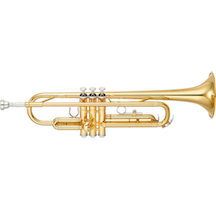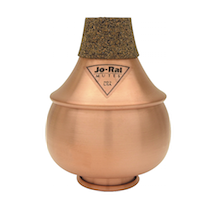Trumpet Buying Guide | Woodwind & Brasswind : The Music Room
Learn All About the Trumpet
Trumpets have existed in some form for well over 3,000 years and have become one of the most recognizable and iconic of musical instruments.
What Family is the Trumpet In?
The trumpet is a brass instrument. While most will recognize the standard shape and sound of the common trumpet, which is in the key of Bb, there are many other members of the trumpet family. These include the cornet (a brass instrument similar to the trumpet but distinguished by its conical bore, more compact shape, and mellower tone quality); the piccolo trumpet (the smallest of the trumpet family, pitched one octave higher than the standard Bb trumpet); and the mellow-sounding flugelhorn (similar looking to the trumpet but with a wider, conical bore). There are rarely used orchestral variants such as the alternatively keyed trumpets (A, C, D, Eb, F and G) as well as natural or herald trumpets that are made without valves.
If you’re looking for the strict definition of a trumpet, it’s a conical or cylindrical instrument, consisting usually of a metal tube, a cup-shaped mouthpiece, and a flared bell.
Who Plays the Trumpet?
A musician who plays the trumpet can simply be called a trumpet player or a trumpeter. Almost anyone can learn to play the trumpet – kids as young as 8 years old can start on the instrument. Trumpets are used in a variety of music genres, including jazz, orchestra, rock, Latin, chamber groups, and pep band.
The trumpet can be a very affordable instrument, which makes it accessible to all types of students. The trumpet is also light and portable so it’s easy to transport to and from school, lessons, rehearsals, gigs and performances.
What Does a Trumpet Look Like?
While there are variations and options in the construction of trumpets, most of the instruments in the family contain the same basic and essential parts. Take a look at this picture of a trumpet to see the breakdown of the various parts.

Valves on a Trumpet
While most people are familiar with the push-button piston style valves pictured above, trumpets can also come with rotary valves and some will include a 4th valve beyond the standard three, allowing the player better control on the lower range of the instrument. The make and design of the valves will often vary depending on the category of the instrument, with the beginner models using a hard, nickel-plated alloy that is more resilient to infrequent cleaning and oiling. The highest quality professional trumpets will have valves that are hand-smoothed and polished (a process known as lapping) to provide a quick and flawless response tailored uniquely to the instrument itself.
What is a Trumpet Made of?
These days, trumpets are almost exclusively made from brass. The most common type of brass used is yellow brass, which is 70 percent copper and 30 percent zinc. You may on rare occasion see a solid gold or silver trumpet that could have been custom created.
 Finishes of a Trumpet
Finishes of a Trumpet
Depending on the player’s preference, there are several options available for finishing. Lacquer is the most common finish and is baked onto the completed instrument. Lacquer finishes can produce an instrument with a darker tone and are available on any category of trumpet, from beginner to professional. Silver plating, on the other hand, can give a trumpet a much brighter tone and is applied through the process of electroplating. Gold finishes, in addition to their striking visual impact, can slightly darken the tone and are available only on professional-grade trumpets.
What Does a Trumpet Sound Like?
The trumpeter produces sound from the trumpet by buzzing their lips. It is actually the metal trumpet mouthpiece that produces the sound which is then projected through the bell. The trumpeter changes the pitch of notes by using the valves to change the length of the tube. In general, the longer the tube, the lower the note.
What are Some Top Trumpet Manufacturers?
There are many instrument makers that craft high-quality trumpets. Look for trumpets from Bach, Schilke and Yamaha if you’re looking for incredible professional trumpets and step-up trumpets. If you’re a beginner trumpet player or you’re a music educator looking to purchase for your school music program, look for horns from Allora, Etude, Jupiter or Giardinelli for affordable instruments that will withstand the rigors of student play.
Trumpet Categories
Student Trumpets
This is the starting point for almost every player and this trumpet is designed and manufactured with the learner in mind. Typically made my machine rather than by hand, these trumpets are generally more affordable than the intermediate and professional models. They provide all the tools necessary to learn the instrument, though they may lack some of the more advanced features.
Intermediate Trumpets
Once a student has progressed beyond the capabilities of the student models and is performing in varied musical ensembles, a more advanced trumpet is in order. The intermediate models of trumpets provide additional features such as slide hooks, adjustable slide stops (especially on the 3rd valve slide), more plating options and higher-quality cases. Many intermediate models can even include the weight and sound improvements provided by professional models, though to a lesser degree.
Professional Trumpets
A professional trumpet is a work of art. These instruments are normally made entirely by hand out of the highest quality materials possible, and allow for variations on weight and the thickness of the metal, which can have a profound impact on the sound produced. For the serious college student and professional musician, a well-made and well-maintained professional trumpet can let them create decades of music.
Trumpet Accessories
Maintenance is an important part of owning a trumpet and there are many care & cleaning accessories that will be needed throughout the life of any instrument to keep it responsive and performing at the highest level. Mouthpiece brushes and cleaning snakes help prevent the build-up of material within the body of the trumpet that can impact air-flow. Valve oil is a necessity to keep the valves’ mechanisms moving freely and quickly.
In addition to these maintenance related items, other common accessories for trumpet players often include items more suited to musical needs, such as different types of mouthpieces and several different variations of brass mutes. Lastly, while many intermediate and most professional cases provide some room for these additional items, cases made exclusively for trumpets can provide ample storage for all the player’s accessories and provide much-needed protection for your instrument.
Buying a Trumpet at Woodwind & Brasswind
Purchasing a trumpet involves knowing what instrument best fits your needs, age, and skill level. When buying a beginner’s first instrument, it is beneficial to speak to the student’s band director or private instructor before making a final buying decision.
No matter what type or category of trumpet you are shopping for, Woodwind & Brasswind has been meeting the needs of students and professionals for decades. Each purchase is backed by Woodwind & Brasswind’s 100% Satisfaction Guarantee, giving you 45 days to decide if the instrument is right for you. If it’s not everything you need it to be, you can return it for a full refund. *
While making sure you found the right instrument is important, making sure the price is right matters, too, and Woodwind & Brasswind’s 45-Day Price guarantee means that even if you find the same model trumpet for less elsewhere, we’ll make up the difference. As musicians of all levels have done for decades, you can buy from Woodwind & Brasswind with complete confidence that you received the best instrument for the very best price.
*All returned woodwind and brass instruments are assessed a $10.00 sterilization fee. Instruments priced over $3,000.00 are assessed a $20.00 fee. All mouthpieces are assessed a $4.00 fee.

 Finishes of a Trumpet
Finishes of a Trumpet